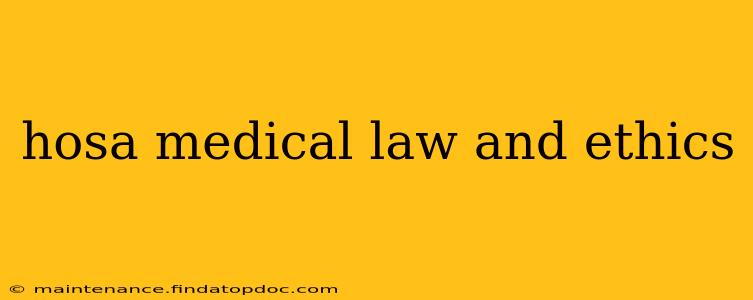The Health Occupations Students of America (HOSA) competition in Medical Law and Ethics requires a deep understanding of the legal and ethical principles governing healthcare. This comprehensive guide will explore key areas, answering frequently asked questions and providing valuable insights for students preparing for this challenging event. This isn't just about memorizing facts; it's about developing critical thinking skills to navigate complex ethical dilemmas in realistic healthcare scenarios.
What are the key areas covered in HOSA Medical Law and Ethics?
The HOSA Medical Law and Ethics competition typically encompasses several core areas, including:
- Patient Rights and Responsibilities: Understanding HIPAA regulations, patient autonomy, informed consent, and the rights of patients with disabilities are crucial. This section also examines the responsibilities patients have in their own healthcare, such as adherence to treatment plans.
- Medical Malpractice and Negligence: This section delves into the legal aspects of medical errors, the standards of care, and the process of proving negligence or malpractice. Understanding concepts like duty of care, breach of duty, causation, and damages is vital.
- Bioethics and Ethical Decision-Making: This area explores complex ethical dilemmas, such as end-of-life care, genetic testing, organ donation, and resource allocation. Ethical frameworks, like utilitarianism and deontology, are frequently examined.
- Healthcare Laws and Regulations: This involves familiarity with federal and state laws impacting healthcare, including HIPAA, EMTALA (Emergency Medical Treatment and Active Labor Act), and the Americans with Disabilities Act (ADA).
- Professionalism and Scope of Practice: Understanding professional boundaries, maintaining patient confidentiality, and adhering to one's scope of practice are essential aspects of ethical healthcare practice.
What are some common ethical dilemmas faced in healthcare?
Healthcare professionals frequently encounter difficult ethical dilemmas. Some common examples include:
- Confidentiality vs. Mandatory Reporting: Balancing the need to protect patient confidentiality with the legal obligation to report certain information, such as child abuse or suspected communicable diseases.
- Informed Consent: Ensuring patients fully understand the risks and benefits of a procedure before consenting to treatment, especially when dealing with patients with cognitive impairments or language barriers.
- End-of-Life Care: Navigating the ethical considerations surrounding end-of-life decisions, including the use of life-sustaining technologies and advance directives.
- Resource Allocation: Making ethical decisions about the allocation of scarce medical resources, particularly in situations involving multiple patients with competing needs.
How can I prepare for the HOSA Medical Law and Ethics competition?
Effective preparation involves a multifaceted approach:
- Thorough Research: Utilize reputable resources such as medical ethics textbooks, legal journals, and government websites to gain a comprehensive understanding of the relevant laws and ethical principles.
- Case Studies: Analyzing real-life case studies will help you apply theoretical knowledge to practical scenarios. Practice identifying the ethical and legal issues at play and developing potential solutions.
- Practice Competitions: Participating in practice competitions, even mock events, will familiarize you with the format and timing pressures of the actual competition.
- Teamwork: If participating in a team event, effective communication and collaboration are key. Practice working together to analyze cases and formulate responses.
What resources are available to help me study?
Numerous resources are available online and in libraries. Explore relevant textbooks, journal articles, and websites from reputable medical and legal organizations. Seek out resources specifically designed for HOSA competitors.
How does HIPAA relate to Medical Law and Ethics?
The Health Insurance Portability and Accountability Act (HIPAA) is a crucial aspect of Medical Law and Ethics. It mandates the protection of patients' Protected Health Information (PHI). Understanding HIPAA's privacy rules and the penalties for violating them is essential for all healthcare professionals. This includes understanding permissible disclosures, patient rights regarding their PHI, and the security measures required to protect electronic PHI.
What is the difference between medical malpractice and negligence?
While closely related, there's a distinction: Negligence is a general legal term referring to a failure to exercise the care that a reasonably prudent person would exercise in similar circumstances. Medical malpractice is a specific type of negligence that applies to healthcare professionals. It occurs when a healthcare provider's actions (or inactions) fall below the accepted standard of care within the medical community, resulting in harm to the patient. The key difference lies in the standard of care applied—a professional standard in medical malpractice versus a reasonable person standard in general negligence.
This guide provides a foundational overview. Remember to delve deeper into each area to gain a complete understanding of the complexities of Medical Law and Ethics. By combining in-depth knowledge with strong analytical skills, you can excel in the HOSA competition and prepare for a successful future in healthcare.
